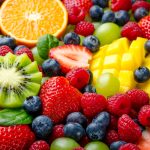Meet the secret superheroes in your food fighting cancer and heart disease
 (NaturalHealth365) Have you ever wondered why fruits and vegetables are hailed as nutritional powerhouses? The secret lies in flavonoids, a group of phytochemicals studied for many years. These naturally occurring compounds, plentiful in foods such as parsley, blueberries, and oranges, are gaining attention for their potential to guard against cancer and heart disease.
(NaturalHealth365) Have you ever wondered why fruits and vegetables are hailed as nutritional powerhouses? The secret lies in flavonoids, a group of phytochemicals studied for many years. These naturally occurring compounds, plentiful in foods such as parsley, blueberries, and oranges, are gaining attention for their potential to guard against cancer and heart disease.
New research shows flavonoids possess promising anticancer properties, modulating various pathways and offering potential as complementary chemopreventive agents against breast cancer with fewer side effects than conventional therapies. Another study published in Nature Communications examined data pulled from the Danish Diet, Cancer, and Health cohort that looked at the diets of more than 53,000 Danes for 23 years. Study authors discovered that individuals who got moderate to high amounts of flavonoids in their diets were less likely to die from heart disease and cancer.
Mounting evidence backs up the benefits of flavonoid intake
Over the past few decades, multiple studies have suggested that flavonoids may help reduce the risk of pancreatic, lung, breast, prostate, and colon cancers. The above-linked new research revealed the diverse impacts flavonoids have on cancer cells, showing they can slow down tumor growth, stop cancer from spreading to other parts of the body, and even trigger cancer cell death, a process called apoptosis.
Moreover, the researchers stressed the importance of including plenty of flavonoid-rich foods in one’s daily diet to lower the chances of getting breast cancer. Regularly eating foods packed with flavonoids can strengthen your body’s natural defenses against cancer, taking a proactive step toward prevention.
Another study found that not only did consuming flavonoids help reduce the risk of dying from cancer and heart disease, but it was also beneficial for individuals who had a higher risk of chronic diseases because of heavy drinking or cigarette smoking. According to researchers, these findings are critical because they show the ability of flavonoid-rich foods to help prevent chronic disease in individuals who have the highest risk.
Keep in mind that depending on how much abuse your body has endured, consuming more flavonoids may not be enough. Limiting (or avoiding) alcohol consumption, smoking, and as many other toxins as possible can go a long way toward protecting your health. Don’t feel overwhelmed; just pick out one lifestyle change – like eating a fresh (organic) apple – every day, and your body will thank you.
The best way to get enough flavonoids into your diet
So, how much do you need to get the best results?
Researchers find that getting around 500 mg of flavonoids daily resulted in the lowest risk of heart disease and cancer-related death. However, to maximize the benefits of increased flavonoid consumption, it’s essential to consume a variety of different flavonoids.
You can get flavonoids from tea, fruits, and vegetables. And, to give you an idea of how much is in food – here’s a short list:
- One cup of blueberries or blackberries contains over 400 mg
- One cup of green tea can contain as much as 1,000 mg
- One small red apple with skin has around 200 mg
- Plus, red onions, celery, and kale are also high in flavonoids
No doubt, flavonoids have a remarkable (anti-inflammatory) effect on the body – which may be why we see a lower risk of death due to cancer or heart disease. They also improve blood vessel function, which provides additional heart health benefits.
The bottom line is that if you’re looking for a way to prevent cancer and heart disease, increase your flavonoid consumption. Remember, eating plenty of (organic) fruits and veggies – daily – can save your life, so get started today.
Sources for this article include:
NIH.gov
Nature.com
NutritionReview.org
LifeExtension.com
NIH.gov



